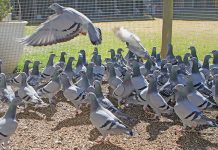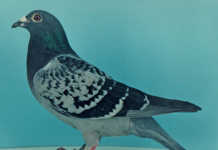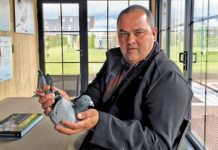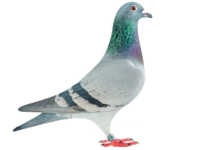Points champion Racing
Pigeons earn this title by the merit of their performance. Not all points champions are equally good and the points systems of different pigeon clubs and organisations vary worldwide. Different champions earn different points totals for various race categories. Certain competitions are reserved for cocks or hens only, or for young birds, yearlings, or two-year-old birds. Champion pigeons may score in more than one category.
The points system
Clubs, divisions and organisations allocate points throughout pigeon season to individual birds, from the first position down to position 30, 50, 100 or 200. The winner earns the most points per race. At season end, points are tallied and pigeons with the most combined scores within each category are crowned champion pigeons for the respective club, division or organisations.
Overrated champions
Depending on where fanciers live and which organisation they participate through, competition strength may differ to such an extent that the true value of a champion pigeon may be overrated. A points league winner who competes against thousands of pigeons should be awarded higher merit than the winner who only competed against a few hundred pigeons.
Certain pigeon families are genetically bred to specialise in different race distances and specific weather conditions – this is known as “horses for courses.”
It would be unfair to expect a sprint pigeon to compete against a long-distance marathon pigeon, as each type is best within the category they are trained for. To effectively measure each racer’s success in a competition, judges need to isolate the race category in fairness to the pigeon’s capability. A coefficient system is thus introduced to properly evaluate and identify champion pigeons.
The Olympiad World Champions
The Federation Colombophile Internationale (FCI) is an Olympiad world body and pigeon racing events coordinator. The FCI approved a coefficient points system which measures the value of the points scored against the competition field (the number of pigeons in each race event) and the distance flown.
An International Pigeon Olympiad is held every two years, where all the champion pigeons of the world are brought together under one roof and are then crowned and honoured with gold, silver or bronze medals. Such pigeons are the celebration of quality; they epitomise a lifetime’s work in selective pigeon breeding.
South Africa had the honour of hosting an Olympiad in Cape Town in 2001. Belgium, the Netherlands, Poland, America, Germany, China and Italy are among some of the 50 countries who traditionally compete in the Olympiads. The previous one was held in Germany and the next will be hosted in Poland. The Olympiad acknowledges the world’s best pigeons in competitive racing.
The coefficient points system
The coefficient points system the FCI advocates is worked out as follows. First, multiply the position number achieved by the pigeon in the race by 1 000 and then divide this number by the number of pigeons in the race. If there were more than 5 000 pigeons in a race event, the coefficient is reached by using 5 000 as a cut-off dividend. This levels the playing field to give more competitors a fair chance, as not all organisations have the amount of pigeon fanciers necessary to reach such a large birdage in a single race.
Coefficient method example: a winning position against 5 000 pigeons will work out as 1 x 1 000, divided by 5 000, resulting in a coefficient of 0.2 for that race event. The best four to six coefficients flown are then added together to reach a combined total. The pigeon with the lowest total wins the category, which is called a class.
The classes are divided into sprint, middle and long distance. The all-round class awards the best birds across all three categories. The system demands that an Olympiad nominee should be able to repeat its racing performance over a minimum of four to six race events, depending on the requirements of the class. Candidate pigeons needn’t be winners in order to enter the Olympiad. In a weaker competition, a winner may not earn the best coefficient anyway.
Celebrating quality
The Olympiad winners are the pigeons who proved to be the most consistent racers in a number of race events over one or two seasons. The competition distances are as follows: Category A: short – 100km to 400km; B: middle – 300km to 600km; C: long – above 500km; D: all-round – candidate pigeon must score in a combination of all distances. The South African National Pigeon Organisation (SANPO) awards a permanent trophy to each SA Trophy winner instead of a medal.












